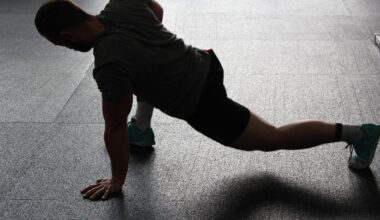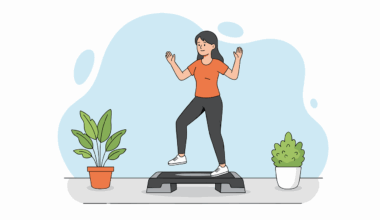Harnessing Meditation for Faster Kickboxing Recovery
Meditation is an excellent tool for athletes, especially kickboxers, aiming to recover swiftly and effectively. Recovery is critical in kickboxing due to the intense physical demands of training and competition. Practicing meditation helps in calming the mind, reducing stress, and promoting a faster recuperation process. When kickboxers incorporate meditation into their recovery strategies, they develop mental resilience, which directly translates to better performance. The dual benefits of meditation—emotional and physical healing—make it a holistic approach. Kickboxers can manage pain and fatigue efficiently while enhancing their overall mindset and focus. Moreover, meditation encourages mindfulness, allowing athletes to connect with their bodies on a deeper level. By tuning into their feelings and sensations, they learn how to respond intelligently to fatigue. Techniques like deep breathing and guided visualization can further aid recovery by stimulating relaxation responses in the body. Additionally, this practice not only enhances recovery speeds but also reduces the likelihood of injuries during training. In essence, meditation should become a core component of the recovery arsenal for any dedicated kickboxer.
Alongside meditation, integrating proper nutrition plays a vital role in the recovery process for kickboxers. Consuming nutrient-rich foods immediately after training is essential for muscle repair and replenishment of energy stores. Foods high in protein, healthy fats, and carbohydrates provide the necessary building blocks your body needs to recover. For example, including lean meats, fish, nuts, and whole grains in meals can significantly support recovery efforts. Kickboxers should also consider hydration as a crucial element, as water aids digestion and nutrient absorption. Dehydration can lead to fatigue and prolonged recovery times, which is detrimental in a sport that requires peak performance. Incorporating anti-inflammatory foods, such as berries and omega-3-rich sources, can reduce soreness and expedite healing. Planning meals around training schedules ensures a steady supply of energy and nutrients. Furthermore, engaging in post-training recovery rituals that combine meditation with proper nutrition provides a comprehensive approach. This synergy fosters an environment where both your body and mind are aligned for optimal recovery. In doing so, kickboxers set themselves up for sustained performance gains, improved mental clarity, and better overall well-being in their practice.
The Role of Sleep in Recovery
Equally significant in enhancing kickboxing recovery is the practice of ensuring quality sleep. Sleep acts as a critical restorative process that impacts physical performance, mental function, and overall health. Kickboxers often push their limits, leading to accumulated fatigue which can hinder their recovery if not appropriately addressed. Lack of sleep can exacerbate this issue, leading to decreased performance levels and increased susceptibility to injury. Aiming for seven to nine hours of sleep each night is ideal for kickboxers. Creating a calm nighttime routine, including meditation, can enhance sleep quality. This preparation signals the body to wind down, facilitating deeper rest during the night. Consistency is also key; practicing good sleep hygiene will train your body to expect restful periods. Furthermore, avoiding screens before bedtime allows your brain to relax further, promoting better sleep. Recognizing the role of sleep as an integral part of recovery puts athletes in a healthier mindset. When the body regenerates during deep sleep stages, kickboxers awaken revitalized and ready to tackle new training challenges. Thus, balancing meditation with proper sleep hygiene will yield profound benefits.
Adopting progressive muscle relaxation techniques during meditation further augments kickboxing recovery. This strategy involves tensing and relaxing different muscle groups, facilitating deeper relaxation after rigorous training sessions. As kickboxers work through muscle tension, they become more aware of their body’s needs and signals. This awareness aids in directing recovery efforts effectively. Additionally, progressive muscle relaxation helps reduce stress and anxiety, allowing the athlete to enter a more meditative and restful state. Kickboxers can enhance this practice by using guided audio sessions or apps designed to assist in relaxation techniques. Scheduling these recovery sessions not only promotes consistency but also helps establish a dedicated time to focus solely on mental and physical rejuvenation. The cumulative effects of these practices will lead to decreased muscle soreness and improved range of motion. Consequently, kickboxers who integrate progressive muscle relaxation into their recovery protocols experience quicker returns to peak performance. This technique empowers them to listen to their bodies, adapt their training accordingly, and ultimately create a more sustainable approach towards a competitive kickboxing career.
Mindfulness and Its Benefits for Kickboxers
A key component of meditation is mindfulness, which involves being fully present in the moment. This quality is crucial for kickboxers, especially when recovering from intensive sessions. Engaging in mindfulness practices allows athletes to focus on their current sensations, both physical and emotional, which informs better recovery strategies. Awareness of bodily signals helps kickboxers discern between pain and normal fatigue. Moreover, mindfulness cultivates a non-judgmental attitude, enabling athletes to observe their recovery journey without undue stress or self-criticism. This practice not only aids physical recovery but also enhances mental well-being. By incorporating mindfulness into daily routines, kickboxers develop a greater appreciation for each training phase and reduce the likelihood of burnout. Simple techniques include mindful breathing or body scanning, easily incorporated during post-training relaxation periods. Furthermore, being conscious of one’s thoughts and feelings fosters a sense of control over the recovery process. This empowerment leads to better decision-making in training and recovery protocols. Therefore, mindfulness should be a foundational element within the broader context of kickboxing recovery practices.
Stretching is another effective way to promote recovery for kickboxers, and can be complemented by meditation. Including stretching routines enhances flexibility and enhances overall muscle recovery. Kickboxers should integrate dynamic stretching before training and static stretching afterward. The combination of these techniques allows muscles to recover more comprehensively, minimizing tightness and soreness. Post-training stretching sessions would pair well with a meditative practice to facilitate a state of relaxation. The mindful aspect can help kickboxers increase body awareness while stretching, ultimately making better use of their time. Furthermore, research shows that active recovery techniques, such as stretching, can improve blood circulation, thereby aiding recovery. Optimal blood flow provides nutrients and oxygen to fatigued muscles while removing toxins. Additionally, this integrated approach helps in maintaining a balanced injury prevention strategy. As flexibility improves, the risk of strains or sprains diminishes significantly. Accordingly, combining meditation with a comprehensive stretching routine increases both recovery efficiency and performance potential. Kickboxers, who acknowledge the synergy between stretching and meditation, position themselves for sustained success in their rigorous training regimens.
Conclusion: Embracing Meditation for Optimal Recovery
In conclusion, harnessing meditation for kickboxing recovery opens up an array of benefits that tackle both the physical and mental aspects of the sport. By integrating meditation with proper nutritional practices, quality sleep, progressive muscle relaxation, mindfulness, and effective stretching routines, kickboxers can optimize their recovery processes. This holistic approach ensures that athletes not only recover faster but also perform at their best consistently. Adopting these techniques fosters resilience and aware engagement in their training journey. Through meditation, athletes cultivate a deeper understanding of their bodies and develop a more sustainable mindset towards training. It becomes clear that achieving peak performance extends beyond physical training, encompassing mental strategies that enhance overall well-being. As kickboxers embrace these recovery techniques, they become empowered to push their boundaries while maintaining health and longevity in their careers. Ultimately, the practice of meditation emerges as a vital component in a kickboxer’s training regimen, fostering an environment where they can thrive and evolve as athletes.
Kickboxers are encouraged to explore various meditation techniques to find what best suits them. The journey toward recovery is unique for every athlete. Finding joy in the process of recovery can significantly enhance an athlete’s performance. This understanding also helps in crafting personalized recovery routines that cater to individual needs. Hence, experimentation can lead to groundbreaking improvements in kickboxing recovery. Embracing meditation as part of the routine creates lasting benefits that extend far beyond physical performance. In doing so, kickboxers set themselves up for a virtuous cycle of engagement and recovery, where each improves the other. The art of kickboxing, when paired with meditation, evolves from a mere sport into a path of self-discovery, resilience, and continuous improvement. Athletes should be encouraged to prioritize these practices, ensuring they embrace this dynamic deeply for a long-lasting career in kickboxing. Through consistent efforts in both recovery and performance, kickboxers position themselves for success that transcends their physical limitations, embracing the full spectrum of what the sport can offer. Aiming to master both the body and mind is the key to maximizing longevity and prowess in kickboxing.


